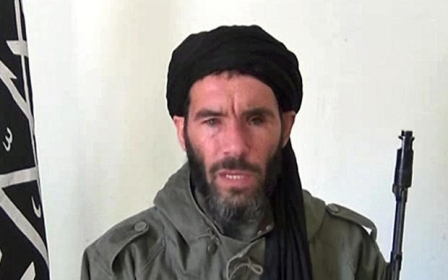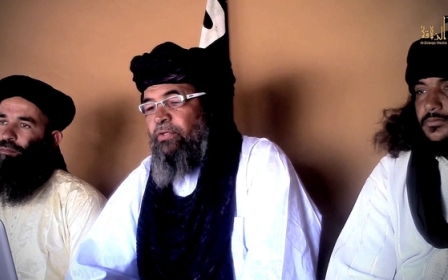Armed Islamist leaders in Libya claim al-Qaeda's Belmokhtar is still alive

ALGIERS – Is Mokhtar Belmokhtar, the world’s most wanted Algerian, still alive?
Quoting Libyan security sources' intelligence from armed Islamists, London-based Saudi magazine El Majalaa reported that Mokhtar Belmokhtar - an emir affiliated to al-Qaeda in the Islamic Maghreb (AQIM), whose death was announced by the United States in 2013, 2015 and 2016 - is, in fact, alive.
While three armed militants in contact with the Libyan sources confirmed that Belmokhtar - also known as "Le Borgne" or "the One-Eyed" after losing an eye in Afghanistan - was killed by an American strike in Libya's Derna, a number of which occurred in 2015, two Islamist leaders affirm that he made it out alive, and is currently somewhere between the borders of Chad, Niger and Mali.
A source in the Algerian intelligence services said it does not know if Belmokhtar is alive or dead, adding, however, that if he had indeed been killed the news would have spread among tribes in the region.
The source also said it believes it is possible that he was grievously wounded during a strike and is currently very weakened, which could explain him being cast to the side within al-Mourabitoun, which is affiliated with AQIM and has belonged to a coalition of several militant groups in the Sahel since February 2017.
According to the confessions of the Islamists, who are accused of having acted in the name of the Islamic State (IS) group while collaborating with al-Mourabitoun, Belmokhtar allowed some of his lieutenants, notably “his right-hand man, Yahya Abu al-Hammam”, to cooperate with IS leaders while remaining committed to his allegiance to al-Qaeda leader Ayman al-Zawahiri.
The Algerian security source expressed scepticism. “A rapprochement between Belmokhtar and the Islamic State is simply impossible. Daesh (IS) in Libya sentenced Belmokhtar to death in 2015. The latter even escaped an assassination attempt,” the source said.
Abu al-Hammam, the alias of 40-year-old Algerian Djamel Okacha, is AQIM’s second in command behind Abdelmalek Droukdel.
He was allegedly seen in the past several months with several AQIM and IS leaders in different southern areas of Libya, notably at the border with Algeria and Niger - a step that he would never have undertaken without Belmokhtar’s green light, the Libyan Islamists claim.
“Here again, the claims seem unlikely: first, because Mokhtar Belmokhtar and Yahya Abu al-Hammam haven’t seen each other since 2012 or 2013, at the time when the Islamist groups occupied northern Mali,” the Algerian source said.
“Even if they obey the same leaders - Abdelmalek Droukdel and Ayman al-Zawahiri - they do not have an organic relationship. Furthermore, al-Mourabitoun would never make this decision unilaterally since it follows the collegiality principles of Iyad ag-Ghali’s group, the Group to Support Islam and Muslims [GSIM].”
Calls for unification against Haftar
According to the Libyan security sources cited by El Majalaa, a rapprochement is apparently in progress between AQIM and IS in Libya.
“In the past few months, there have indeed been a number of calls to unify fighters in Libya under the banner of a single organisation to face the blows dealt by Haftar’s Libyan National Army [LNA],” a source who follows the activity of groups in Libya told MEE.
“Some of these calls have been shared on Twitter by some armed Islamist groups, different brigades from al-Qaeda or the Shura Council of Mujahideen in Libya. This hasn’t surprised the different security services that have monitored this secret activism aiming to unify 14 Libyan organisations and armed groups. More startling, groups that have sworn allegiance to IS have accepted the negotiations.”
On several occasions, IS fighters have even reportedly been spotted in al-Qaeda-held positions, especially in southern Libya, without their presence leading to clashes.
“Unification attempts started in February 2018. They were notably led by dissidents of the Shura Council of Mujahideen in Derna and councils of other Libyan cities," MEE's source added.
"The Shura Council of Mujahideen in Derna has besides changed its name to now call itself the ‘Derna Protection Forces’. Because this new name no longer corresponds to jihadi Salafi doctrine, this has sparked dissidence.”
According to the source, a rapprochement is also reportedly at work between IS and AQIM in the Sahel.
“There isn’t yet talk of a merger, but we note that the two groups, each with their own zones of influence, have evolved from hostility to non-hostility,” the source said.
Middle East Eye propose une couverture et une analyse indépendantes et incomparables du Moyen-Orient, de l’Afrique du Nord et d’autres régions du monde. Pour en savoir plus sur la reprise de ce contenu et les frais qui s’appliquent, veuillez remplir ce formulaire [en anglais]. Pour en savoir plus sur MEE, cliquez ici [en anglais].






